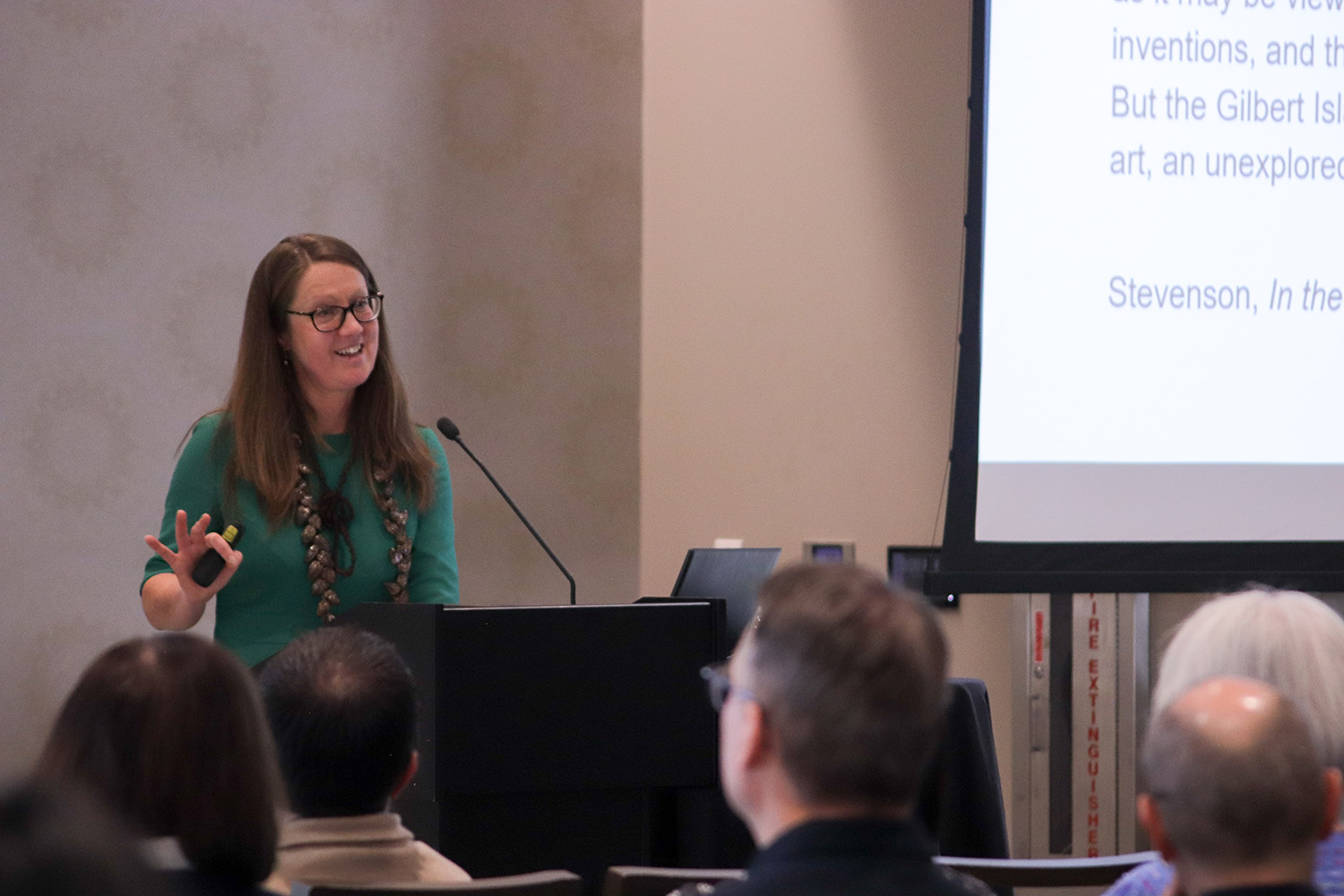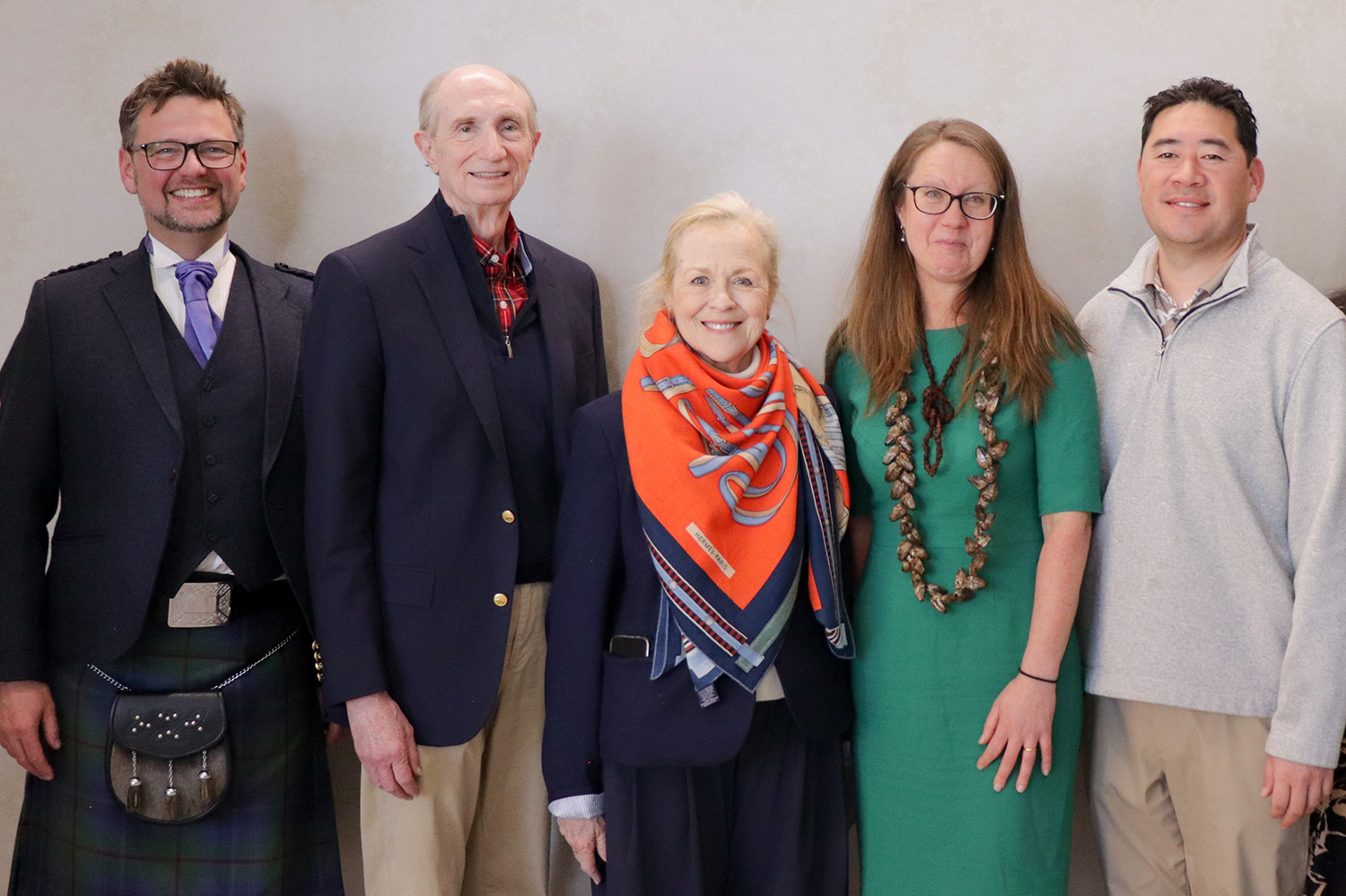Emma Sutton's Gordon B. Hinckley Lecture Examines Robert Louis Stevenson and Samoan Culture

Emma Sutton delivers the annual Gordon B. Hinckley Lecture, January 2025
At the time Robert Louis Stevenson sailed for the Pacific in 1888, he was already an internationally renowned author, celebrated for works like Treasure Island, Kidnapped, and The Strange Case of Dr. Jekyll and Mr. Hyde. Though he initially planned only to write travel articles and seek a healthier climate for his tuberculosis, Stevenson would spend the final six years of his life in Oceania, visiting over 40 islands and ultimately settling in Samoa.
In her lecture, Emma Sutton revealed how music became central to Stevenson’s Pacific experience. At Villa Vailima, his Samoan home, Stevenson created a multicultural household where Scottish reels mixed with Samoan siva dances, and Western instruments like the piano and flageolet joined with Indigenous instruments such as the nose flute and foafoa (conch shell trumpet). Stevenson himself composed music influenced by Polynesian forms and helped establish a cultural club for Samoan women that evolved into an enduring musical organization.
Sutton’s lecture emphasized Stevenson’s complex position in colonial society. From a position of privilege, he developed unusually respectful relationships with Pacific Islanders and became an outspoken critic of British, German, and American colonial interventions. Indeed, Stevenson’s criticisms of colonialism in letters to the Times prompted Parliamentary debates and legal restrictions on anti-colonial speech in Samoa. He learned several Polynesian languages, provided aid to imprisoned supporters of Samoan leadership during civil conflict, and was mourned at his death by some 200 Samoans and Tongans in traditional funeral ceremonies.
In the Q&A, discussion explored parallels with other Western artists in the Pacific, particularly Paul Gauguin in Tahiti. While there’s no evidence the two men met, they shared similar concerns about colonial impacts on Indigenous cultures. The session concluded with testimony from a Samoan-American audience member about Stevenson’s enduring influence in Samoa, where his poetry is still taught in schools and set to music.
In a workshop the following day for the British Studies Research Interest Group, Sutton offered insights into her long-term project editing a critical edition of Virginia Woolf’s first novel, The Voyage Out, for Cambridge University Press. The task involves documenting every textual variation across editions published in Woolf's lifetime, while providing extensive annotations to explain historical, cultural, and literary references. Sutton revealed how seemingly minor details—from Yorkshire gravestone names to references to beetles and the rubber trade—illuminate Woolf’s ideas about social class, colonialism, and the natural sciences. The project exemplifies how detailed textual scholarship can illuminate both an author’s creative process and full meaning of their work for contemporary and future readers.

From left: Chris Jones, Clark Hinckley, Kathleen Hinckley, Emma Sutton and Jake Fitisemanu Jr.
Sutton’s scholarship and visit to the University of Utah exemplifies the Hinckley family’s commitment to supporting humanistic study at the University of Utah. The annual Gordon B. Hinckley Lecture was established to bring leading lecturers and researchers in the field of British Studies to the University of Utah and Salt Lake City community. The series presents intellectually and academically rigorous scholarly works and is offered free of charge to students and the public.
About The Gordon B. Hinckley Endowment for British Studies
The Gordon B. Hinckley Endowment for British Studies was named to honor Gordon B. Hinckley, former President of The Church of Jesus Christ of Latter-Day Saints and a distinguished alumnus of the College of Humanities. It honors President Hinckley’s love of literature, learning, and his admiration for Great Britain’s cultural and institutional contributions to the world. The endowment enables the Department of English to invite distinguished scholars and teachers from across the globe to the University of Utah as guest lecturers. Previous lecturers include Dr. Chris Jones (University of Utah), Dr. Julia Lupton (UC Irvine), Dr. Chris Brown (Columbia University), Dr. Tim Barringer (Yale University), and Dr. Linda Colley (Princeton University).
